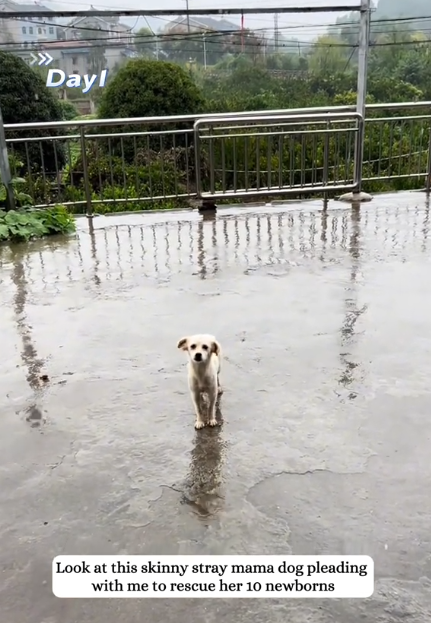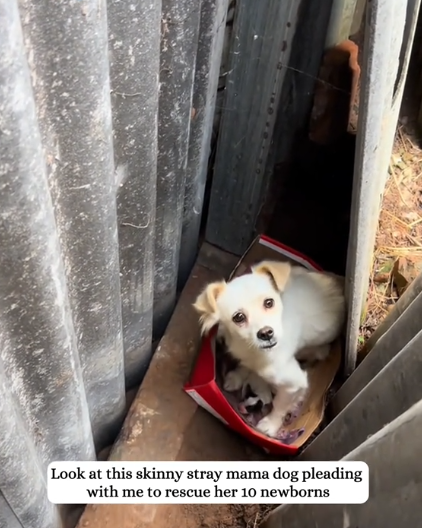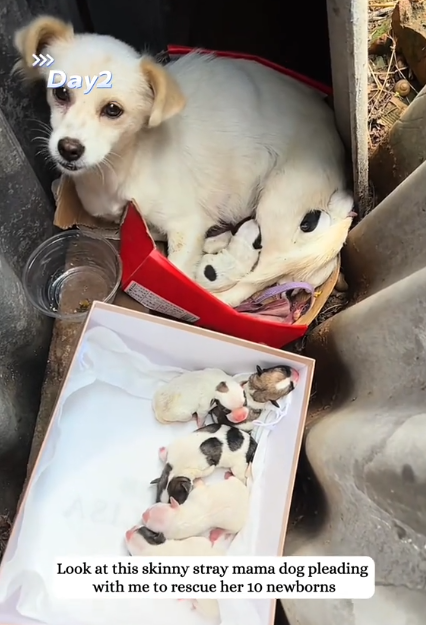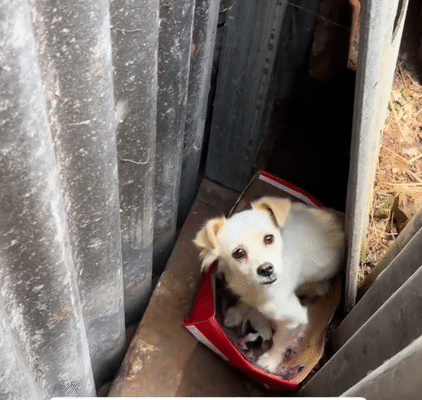
It was one of those unexpectedly warm afternoons in early spring, when the air smells faintly of dust and flowers. I was walking back from the small market, arms heavy with groceries, when I saw her. She came limping from the far side of the road—her ribs like a cage under patchy fur, eyes wild yet pleading.
At first, I thought she was just another stray looking for scraps, but then I noticed something that made my breath catch—her hindquarters were wet, streaked with blood and fluid. She had just given birth. My heart dropped.
She stopped in front of me, tail tucked, head lowered, yet her gaze locked on mine in a way that felt almost human. She let out a soft, broken whine. It wasn’t the sound of a dog asking for food—it was a cry for help.
Instinct took over. I dropped my grocery bag to the ground and crouched, murmuring softly. She edged closer, trembling, her nose brushing my hand. Then, as if reassured, she turned away and took a few steps toward a clump of overgrown grass beside an abandoned shed. She glanced back at me, as if to say, Come on.
I followed.
The moment I pushed through the grass, I saw them—four tiny, damp puppies squirming against the cold earth. Their eyes were still sealed shut, their squeaks so small they barely reached my ears. My chest tightened. This mama had given birth right here, on bare dirt, with no shelter and no warmth.
But she wasn’t done. She circled the spot twice, then lay down and began straining again. Another pup slipped into the world, slick and trembling. She licked it frantically, nudging it toward the others. Then another came. And another.

By the time she had delivered her seventh pup, I was on my knees beside her, using my scarf to help dry the newborns. The smell of blood, milk, and earth was strong, but so was the smell of desperation. Her body was skeletal—every rib and hip bone sharp beneath her skin—yet she labored on with the determination only a mother could have.
The last pup came just as the sun began to dip, casting a golden light over the scene. Ten tiny lives, each squirming, each fighting for warmth, all huddled against their exhausted mother. She lay still, sides heaving, eyes half-closed, yet she kept licking them, counting them in her own way.
I looked around. There was no way I could leave them here—not with the cold night coming, not with stray dogs and other dangers nearby. But moving a mother and newborns is risky; she could panic, she could reject them. Yet when I reached for her, she didn’t snap or pull away. Instead, she lifted her head and pressed her nose into my palm, as if giving me permission.
I dashed home for a cardboard box lined with old blankets, then hurried back. Carefully, I placed the pups inside, one by one. The mama watched, ears twitching, but stayed calm. When I picked her up—so light, she felt like air—she tucked her head against my chest.
At home, I set them up in a quiet corner, away from noise and drafts. I warmed a hot water bottle under the blankets and placed the pups close to it while their mother settled beside them. She curled herself around them like a shield, her body finally relaxing. I brought her a bowl of warm chicken broth and some soft rice. She devoured it in minutes, her tail wagging weakly for the first time.
Over the next few days, the transformation was slow but steady. I named her Luna—because she had found me just as the moon was beginning to rise that day. Luna was gentle, never once growling when I handled her babies to check their health. She seemed to know I was there to help.
Her pups—tiny beans of fur—were each different: a snow-white one I called Blizzard, a brown-patched one named Marble, a sleek black one I nicknamed Shadow, and so on, until each had a little identity. Feeding time was constant. Luna’s body was still recovering from starvation, so I gave her puppy formula, goat’s milk, and protein-rich meals to help her produce enough milk.

But Luna… oh, Luna was magic. Even in her weakened state, she never neglected a single pup. She licked them clean after every feeding, nudged the sleepy ones awake so they wouldn’t miss a meal, and kept them piled close so no one would get cold. I watched her and thought, If she can give everything she has, so can I.
The first time the pups opened their eyes was a morning I won’t forget. Luna seemed to notice too—she sniffed each one and then looked at me as if to share the moment. Their wobbly attempts at walking brought laughter into my kitchen, and for the first time in a long while, my home felt truly alive.
But caring for ten puppies and their mother wasn’t without challenges. Vet bills began stacking up. One of the smaller pups, Tiny Tim, struggled to gain weight and needed extra bottle feedings around the clock. Another developed an eye infection that had to be treated gently every day. I was exhausted, but every small victory—the day Tiny Tim finally doubled his weight, the day the infection cleared—made it worth it.
Neighbors started stopping by, curious about the little family. Some brought dog food or old towels, others just came to watch the puppies tumble over each other. Luna accepted the visitors but always kept an eye on her brood, ready to nudge them back into the blanket nest if she thought they were getting too cold.
By the time the pups were six weeks old, the house was a storm of tiny paws and wagging tails. Luna had filled out beautifully—her ribs no longer visible, her coat shiny, her eyes bright. She even began to play again, gently wrestling with the pups and sometimes chasing a ball a neighbor’s child would roll across the floor.
I knew the hardest part was coming—finding homes for all ten. But I also knew that each pup deserved a family who would see them the way I saw Luna that first day: not as a burden, but as a soul worth saving. I worked with a local rescue group to screen adopters, making sure every home was safe and loving.
One by one, the pups went to their new families. Each goodbye was bittersweet, but each time I saw a pup in the arms of someone who promised to love them forever, my heart felt lighter. Luna stayed with me. I couldn’t imagine letting her go—not after what we’d been through together
Sometimes I still think about the moment she found me—how she had been in the middle of giving life yet trusted a stranger with everything she had. That trust changed both our lives.
Now, when Luna curls beside me on the couch, her head resting on my knee, I run my hand over her warm fur and whisper, “We made it, girl.” And she looks up at me with those same eyes that first stopped me on the street—only now, they’re filled with peace.
It started with heartbreak, but it ended with hope. And that’s the thing about rescue—it’s not just about saving them. Sometimes, they save you too.



